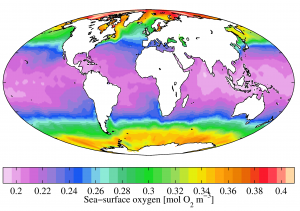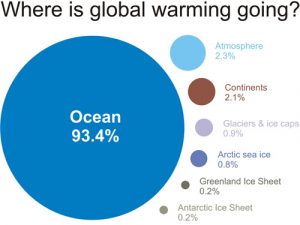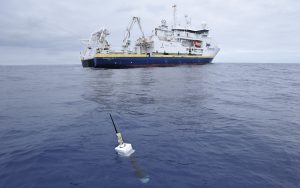Anyone who has seen the any of our world’s oceans can easily appreciate their immensity.

The ocean’s cover 71% of the surface of Earth. Retrieved March 4, 2019 from https://www.goodfreephotos.com/people/woman-standing-next-to-the-ocean.jpg.php
But don’t be fooled. Contrary to what you might think, they aren’t open expanses of habitable environment where any marine species can live and thrive.
As anyone with any background in biology can tell you, just because the space is there, doesn’t mean it can be occupied by any living organism. This is especially true when it comes to the marine environment.
Marine species have to face a number of challenges that many terrestrial species simply would never have to worry about. One of these challenges, that poses a more serious threat because of climate change, is the availability of oxygen.
The Oxygen Minimum Zone
Many complex physical, biological, and chemical processes are constantly taking place within the ocean. Some of which are highly variable, and others are relatively constant.
One feature that arises from a combination of these processes, is the Oxygen Minimum Zone (or OMZ), which are pockets within the water column that contain low levels of dissolved oxygen. These areas are present throughout the world’s oceans and usually occur at a depth of 200 to 1000 metres.
Oxygen Minimum Zones occur naturally and don’t pose a serious threat to marine life. However, researchers have begun to see that some of these low oxygen areas are beginning to expand, as a result of global warming.

Sea surface oxygen levels. Purple are the lowest concentrations and red are the highest. Retrieved March 4, 2019 from https://commons.wikimedia.org/wiki/File:WOA09_sea-surf_O2_AYool.png
The Problem
One benefit of living in the ocean that many terrestrial animals don’t have, is the ability to not only migrate horizontally, but also vertically. In fact, many marine organisms undergo these vertical migrations for many different purposes, such as escaping predation.
There are many studies being conducted, and that have already been done, where researchers are trying to measure how well different marine species are able to tolerate low levels of oxygen.
They can measure this through physiological responses, like metabolism, or behavioural responses, like the frequency and duration of movement within the water column.
One key observation that some researchers have made is that many fish species cannot tolerate low levels of oxygen. So, if the oxygen minimum zones continue to expand, their habitat will become more and more limited.
What Does This All Mean?
Some species with a higher tolerance to low oxygen levels may have an advantage as they are able to escape predation and other competing species.
However, the expansion of the oxygen minimum zones will bring even more challenges to species who need to avoid the low oxygen levels.
This is especially concerning if this includes certain fish species that are an integral part of the food web; not only as a source of food for many other marine organisms, but for the fisheries industry that depends on a large expanse of fish populations.
Cameron Carvalho


